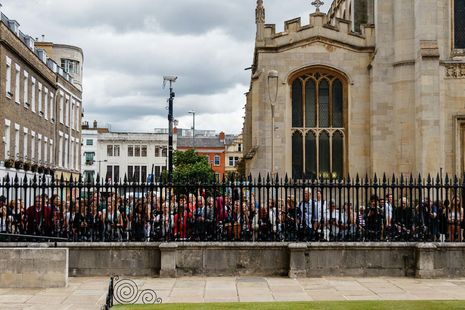Denying the existence of ADHD is deeply problematic
Neurodivergent diagnosis rates are rising at Cambridge, but the claim that students are ‘faking it’ is deeply problematic argues Patrick Dolan

Cambridge is witnessing a growing prevalence of neurodiversity. Last year, we established the prominent presence of OCD here. In December, Varsity revealed that admissions of ADHD diagnoses among Cambridge students have nearly doubled over four years. And just last week, we discovered that ADHD assessments were the second largest financial claim for the Cranes’ Fund.
For many, including myself, coming to Cambridge is central to identifying neurodiversity as it manifests more acutely in this pressured environment. The elevated prevalence of neurodivergent-related challenges in this city isn’t unexpected. After all, to be passionate enough about a subject aged 17 to win over multiple world-leading academics at an interview does slightly scream ‘not quite neurotypical’.
Yet, just last week, Varsity reported that the University is set to halt medical funding for ADHD and autism diagnoses, as well as private medication, from the beginning of April. Their justification comes as the current rate of claims to the fund is said to be at “an unsustainable level”.
“The Times reported an accusation from Dr Fiona Cornish, a Cambridge GP, that Cambridge students are faking ‘ADHD’”
And again, in November, The Times reported an accusation from Dr Fiona Cornish, a Cambridge GP, that Cambridge students are faking ‘ADHD’ to receive extra time in exams. There has been a “massive spike” in students seeking an ADHD diagnosis before exams start, the GP said.
Cornish remarked that it is possible for some students to ‘think they have autism, ADHD, anxiety and depression [but may not necessarily].’ My initial diagnosis of OCD felt daunting, so this comment was particularly disconcerting for me, as an individual who already doubted whether I really had a condition and the uncertainty of what it was.
She also claimed that it was very rare for students to get extra time in exams when she began working as a GP 30 years ago. It seems comparing statistics this outdated is simply a waste of time, considering the changes in recognising neurodiversity. The doctor then even goes on to acknowledge that “lots of people who were really struggling are now getting the help they need.”
This claim of ‘faking it’ is not harmless. It discourages students from seeking a diagnosis and implies they will be perceived as cheating the system is neither fair nor productive. But maybe this is exactly what they want? A prestigious institution which is ironically running out of money to solve the mental health crisis may want you to be discouraged from applying for it.
Accusations of students trying to play the game lack substantial evidence and are extremely invalidating for those of us who are already set up to struggle in an environment often not conducive to neurodiverse experiences.
The surge in diagnoses isn’t merely a fleeting trend but represents a beneficial correction of underdiagnosis. The rise is not the result of neurotypical students flocking to feign neurodiversity. Firstly, statistics show that ADHD prevalence rates at Cambridge are lower than the national average. But more importantly, publicly implying that not every case is deemed valid is frankly disappointing and ableist.
Various theories attempt to elucidate the rise in diagnosis, including increased openness in expression, historical misdiagnoses, and heightened academic pressures. The Head of the Accessibility and Disability Resource Centre at Cambridge and one of the letter’s authors, John Harding, put the increase in diagnosis down to the dual product of “efforts to reduce the stigma” and “increase awareness” of the neurodiverse condition.
The right-wing press jumped on Cornish’s remarks. It was gutting to witness the causal discussion on television when a presenter questioned why alleged smart Cambridge students would need extra time in exams, which completely overlooks the fact that intelligence and neurodiversity are not mutually exclusive.
“Diagnosing and providing appropriate adjustments for any student is not a crime”
If anything, at an institution like Cambridge, they are more inseparable than ever. Diagnosing and providing appropriate adjustments for any student is not a crime; it levels the playing field, ensuring everyone has the capacity to flourish in an academic context.
Rather than accusing students or making them bear the burden, the focus should be on addressing the genuine issue: Cambridge is still learning to correctly accommodate its growing population of neurodiverse students. Those grappling with these conditions already contend with the challenges of navigating Cambridge amid their own personal struggles. Invalidating experiences while being ignorant of the true problem at hand is the more concerning issue here, not the rise in applications for extra time in exams. The University should continue to strive to be an avid advocate of discussion surrounding youth neurodiversity and seek provisions for its students to continue excelling in their university life.
If there really are any cases of neurotypical students faking neurodiversity to gain exam advantages, it would be better to seek individual justices, rather than a blanket public announcement of the loss of confidence in Cambridge students, which will have undeniably devastating effects.
 News / Caius mourns its tree-mendous loss23 December 2025
News / Caius mourns its tree-mendous loss23 December 2025 News / Clare Hall spent over £500k opposing busway 24 December 2025
News / Clare Hall spent over £500k opposing busway 24 December 2025 Comment / Yes, I’m brown – but I have more important things to say22 December 2025
Comment / Yes, I’m brown – but I have more important things to say22 December 2025 Comment / The ‘class’ of Cambridge24 December 2025
Comment / The ‘class’ of Cambridge24 December 2025 Interviews / Politics, your own way: Tilly Middlehurst on speaking out21 December 2025
Interviews / Politics, your own way: Tilly Middlehurst on speaking out21 December 2025







